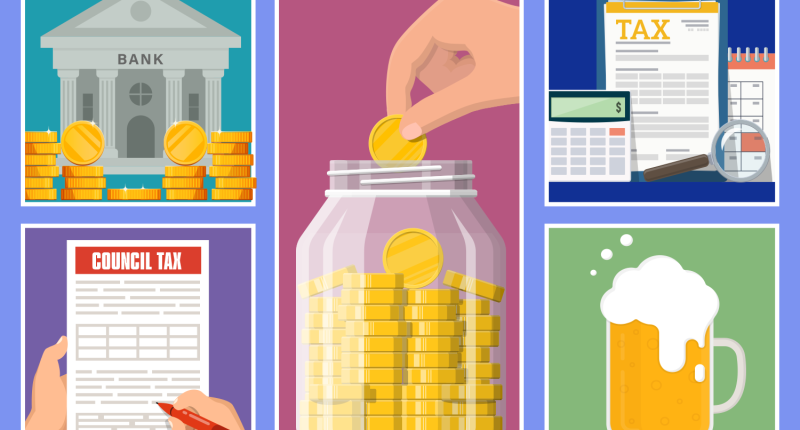MILLIONS of people will see tax changes in 2024 that affect both their income and savings.
From an income boost to changes to ISA rules, there’s a lot on the horizon.
It’s set to be a bumper year for the self-employed, workers, and savers alike.
Some changes kicking in this year have been already announced such as National Insurance cuts and capital gains tax being halved.
Others haven’t been confirmed yet and are expected to be announced in the Spring Budget in March – such as income tax cuts.
We’ve rounded up all the changes set to hit in 2024, and what they mean for your money.
READ MORE IN MONEY
National Insurance cut – January 6
From January 6, the main 12% rate of employee National Insurance Class 1 contributions was cut to 10%.
The Chancellor first announced the change as part of the Autumn Statement.
The change will help 27million people and means that someone earning an average salary of £35,000 will save over £450.
The first cut won’t be applied until your first pay packet after January 6 though.
Most read in Money
Check our guide to find out how much you’re set to save.
Tax return deadline – January 31
Customers have just under two weeks left to submit their online tax return for the 2022 to 2023 tax year.
The deadline for filing paper-form tax returns was on October 31 2023 – but you can still file online until January 31.
Self-assessment customers face a penalty of £100 if their tax return is up to three months late.
Further fines of £10 a day are applied after three months, up to a maximum of £900.
For payments late by six months, you’ll be fined 5% of the tax you owe or £300, whichever is greater.
You can calculate how much your fine will be on the Gov.uk website.
Income tax cuts announced – March 6
Experts are speculating there could be further tax cuts announced in the Spring Budget on March 6.
This is thought to be in preparation for a general election expected in the second half of the year.
It would likely be the last major tax decision before the general election.
Elsewhere the Chancellor has signalled that he would like to cut taxes further, but only when it is “affordable and responsible”.
In other words, bear in mind that any income tax cuts are not yet confirmed but we’ll know more on March 6 after the Spring Budget.
If these cuts are confirmed they likely won’t kick right away though – but the Chancellor would likely give a timeline during his speech.
Inheritance tax abolition announced – March 6
There is also speculation that the Chancellor may announce the abolition of inheritance tax in the Budget.
It would be seen as a move to increase votes ahead of the election.
After the autumn statement in November, the government faced pressure from Tory MPs to go further and cut income tax or inheritance tax.
Mr Hunt, in an interview with the BBC last week, called inheritance tax “pernicious” but said he could not say “whether it is going to be affordable to reduce taxes” in 2024.
Nothing is for certain though, and the abolition of inheritance tax would only likely affect a small amount of the population.
Plus the move wouldn’t happen straight away and could take a while to be implemented.
Some National Insurance contributions axed – April
The self-employed are also set to get an income boost of up to £350 thanks to the axing of some NICs.
The Chancellor announced in his Autumn Statement that he will cut one percentage point off the rate charged for Class 4 NICs.
The move will save two million self-employed workers £350 a year from April.
Class 2 and Class 4 NI are paid by self-employed Brits making a profit of £12,570 or more a year.
Class 2 NI is a flat rate compulsory charge, currently £3.45 a week, paid by self-employed people earning more than £12,570 which gives state pension entitlement.
But from April 2024, the government is abolishing Class 2 National Insurance altogether, saving the average self-employed person £192 a year.
The same workers pay Class 4 NI at 9% on all earnings between £12,570 and £50,270.
But that rate is being cut by one percentage point to 8% from April.
ISA rules will become simpler – April
You can save up to £20,000 a year in an ISA, where this money can grow completely tax-free.
Any interest you earn on savings outside an ISA can also be tax-free, as long as it doesn’t exceed your personal savings allowance
Under current rules, you can only pay into one of each type of ISA in a single tax year.
For example, if you open an instant-access cash ISA in 2023-24, you can’t also open a fixed-rate cash ISA.
From April, the government is making changes to simplify ISAs and provide more choice.
It will be easier for people to choose the best ISA accounts for their needs and move money between them.
The government will allow multiple subscriptions to ISAs of the same type every year from April 2024.
It will also allow partial transfers of ISA funds in-year between providers from the same month.
The government will also raise the account opening age for any adult ISAs to 18 – up from 16.
However, it is freezing the ISA annual allowance at £20,000, Junior ISAs at £9,000 a year and Lifetime ISAs at £4,000 a year.
Capital gains and dividend allowances will be halved – April
Those of you who own investments outside an ISA or are planning to sell a second home or other valuable asset should be aware of upcoming cuts to tax-free allowances.
Under current rules, you can make gains of up to £6,000 before paying any tax – down from £12,300 in 2022-23.
From April though the capital gains tax allowance will be reduced again to just £3,000.
The dividend allowance was also halved from £2,000 in 2022-23 to £1,000 in 2023-24.
It will be further reduced to £500 in April.
Council tax rise – April 1
Council tax is once again expected to rise from April 1.
The payment is an annual fee you pay to your local council.
The cost is set by your council and goes towards funding local services.
The exact amount payments will rise by is set to be announced in February.
This year saw the majority of local authorities hike rates by 5% – though in some cases bills went up by 15%.
Households in six council areas across the UK may be forced to pay more in council tax from this April.
Alcohol duty – August 1
The government has said it will freeze alcohol duties until August 1, 2024.
It was a major win for The Sun’s Save Our Sups campaign.
The freeze will come to an end at the beginning of August though.
The annual uprating decision will be announced in the Spring Budget.
Alcohol duty is a tax charged at the point of production or importation of drinks of alcoholic strength exceeding 1.2% alcohol by volume.
Duty rates differ for beers, ciders and perries, wines, spirits, and other fermented products.
READ MORE SUN STORIES
The last time prices were increased was on August 1, 2023.
The price of some drinks crept up by as much as £1.29 while the cost of a bottle of wine climbed by 44p.
Do you have a money problem that needs sorting? Get in touch by emailing [email protected].
Plus, you can join our Sun Money Chats and Tips Facebook group to share your tips and stories.










